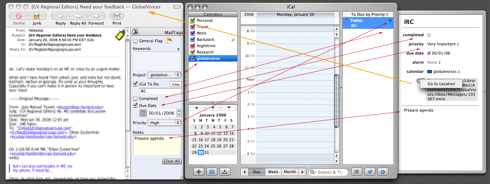It's not that I am going senile or any such thing... it's just that...
"my memory space is being flattened, in places, especially recently, by prolonged use of asynchronous text-based tele communication"
In other words, I am beginning to suspect that the use of such things as Instant Messaging and email is somehow confusing the brain, which is normally used to associating experiences with way more environmental clues (such as person's face, lighting in the scene, sounds around, geo context, etc) than you get with an email or an IM chat.
I've already mentioned that I sometimes imagine conversations with people, in my head/telepathically, as if I were actually having them/via IM. I suspect this is akin to ghost limb syndrome. My brain just assumes I can continue the communication, regardless of TCP/IP stack (er, IM software and internet connection). Whether the person is there or not is irrelevant because as far as my brain knows, it's all imaginary anyways right? I mean, there's no live person in front of me, I did not displace myself to interact with this person, etc.
Now I am also seeing the effects of this, theoretically, on my memory as well. My brain is actively "flattening" my memory space of all my other communication modalities as well, as if to compensate following some sort of "lowest common denominator" rule for how much meta data to store, or at least, to keep actively "close by" and easily accessible.
What that means is, I will remember the message of a communication, almost word for word. But I will need to greatly labor to recall a) WHO the conversation was with b) WHEN the conversation took place c) WHERE it took place, be it in physical space or via which network protocol, and of course all three are related and cross referenced. (If I remember who it was with, if it was with a local, I will have to look further for environment clues such as "was it live conversation?", "was it on the street, or at Laika?", etc etc.)
Of course I make this sound far more drastic than it is, but I also am merely scratching the surface of this phenomenon which I can sense is very definitely happening to me.
(The title of this post is taken from my light hearted impression of my mother who can sometimes be a bit absent minded.)





